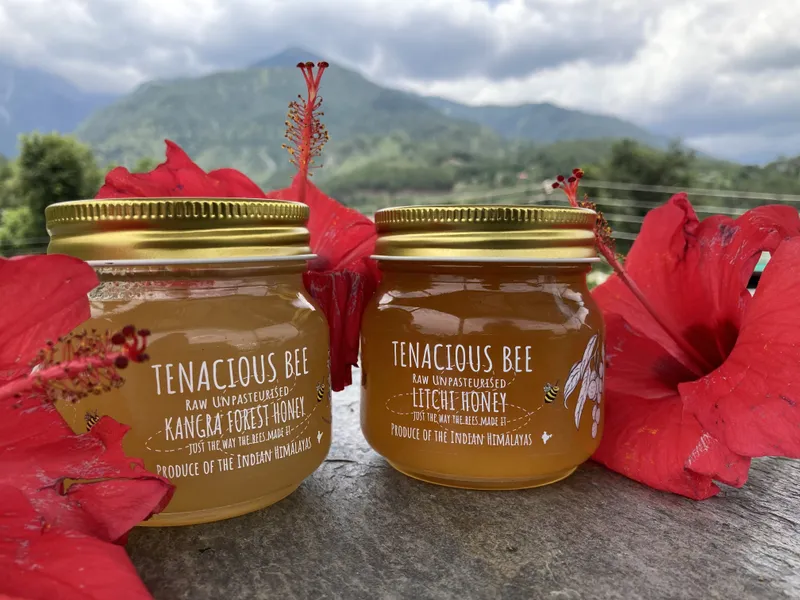[Sustainability Agenda] How this Himachal enterprise promotes ethical beekeeping, creates employment opportunities for rural women
Tenacious Bee Collective tackles multiple issues through the lens of ethical beekeeping with environmentally sustainable practices to enable more employment and income opportunities.
Malini Kochupillai and Kunal Singh first met in 2017 at an exhibition by Khoj, an International Artists Association, where they struck up a conversation about engaging in the community through the arts.
“At the time, I was interested in raw honey. So one of the first things we spoke about was how he might be able to find raw honey in Himachal and bring it for me,” Malini shares.
That search for honey led Kunal to learn more about the conditions of beekeepers in his hometown of Nurpur, Himachal Pradesh. To help these beekeepers resolve some of the challenges that stood in their way, Malini and Kunal co-founded Tenacious Bee Collective.

One of the primary issues was the honey industry was exploitative, not just to the people involved but also to the bees themselves. The authentic, good-quality honey the Himachal region was known for had started fading, and its demand also began dwindling.
“The vicious cycle we saw was compelling to both of us in different ways. Kunal was saddened the art of honeymaking was getting lost, and I was interested in creating community-based solutions around this idea,” Malini tells SocialStory.
Finding support and backing in the community
tackles multiple issues through the lens of ethical beekeeping with environmentally sustainable practices to enable more employment and income opportunities.
The idea was soon backed by a small seed funding from a supporter. At present, Tenacious Bee Collective is bootstrapped.
In 2018, the collective found support in the town of Barsar in Himachal Pradesh. It also found patronage with Kirna Devi, the Pradhan (Head of the Panchayat) there.
As some residents had attended beekeeping sessions conducted a few years ago, they already had bees and hives, but no follow-through had happened.
The organisation turned one of the resthouses, belonging to the panchayat, its operations floor, where it conducted workshops, along with the Craft and Social Development Organisation (CSDO), for 12 women who learned the basics of making salves, soaps, and candles with beeswax.
These products, along with raw unpasteurised honey, are available for consumers through Tenacious Bee Collective’s website and in select stores across India. Apart from sales, it earns from partnerships and subscriptions.
With the enterprise, Kunal also hoped to create employment for the community within the area instead of being forced to look for work in the city. “The women have now taken charge and continue to be advocates for the cause,” Malini says.

Making beekeeping sustainable
In their intervention, Tenacious Bee Collective has attempted to promote more sustainable beekeeping practices. Malini shares the Himachal region has had a long history of beekeeping, and hives are often reared in homes, farms, and forest regions.
The symbiotic relationship between bees and human beings was disrupted by the advent of industrial-scale production of honey, where adulteration became a rising issue.
The exploitation of bees has also led to the decline of the population in the last 40-50 years, Malini shares. “You can also over-extract honey and leave nothing for the bees to feed on,” she explains.
Bees cannot make honey throughout the year. They can only do it during the flowering season when it’s not raining. Thus, bees need some resources to thrive for the remainder of the seasons.
If there is no honey for them, they are forced to survive on sugar, which gives them just sustenance, and thereby doesn’t allow them the health required to harvest honey in the coming seasons.

Tenacious Bee Collective, thus, encourages ethical practices, where beekeepers leave enough honey for the bees and also use double-chambered hives, which allows them to make honey in one while keeping the babies separate.
It also ensures quality beekeeping, where beekeepers are dissuaded from collecting nectar before it turns into honey.
“Our [aim] right now is to shift the gears of as many beekeepers as possible to these best practices so that their bees are healthy,” Malini says.
She stresses the role of the collective is to mitigate the risk the beekeepers take. There are also efforts to encourage the planting of more bee-friendly flora, thereby impacting ecology on a larger scale.
“Farmers, beekeepers, and others who engage in these activities are true custodians of nature. So, it is our job at the community level to empower them,” Malini underlines.
At present, Tenacious Bee Collective’s network involves six beekeepers, five farmers directly, and 40 beekeepers indirectly, where it helps them avail of government schemes and other required support.
In fact, it has also trained 40 community members in beekeeping.
Through its communications, it hopes to influence people to think about where their food comes from and to make more responsible choices in the long run.
YourStory’s flagship startup-tech and leadership conference will return virtually for its 13th edition on October 25-30, 2021. Sign up for updates on TechSparks or to express your interest in partnerships and speaker opportunities here.
For more on TechSparks 2021, click here.
Edited by Suman Singh

![[Sustainability Agenda] How this Himachal enterprise promotes ethical beekeeping, creates employment opportunities for rural women](https://images.yourstory.com/cs/5/54bfb360112e11ecbdb4b127003811f4/Tenacious-Bee-Collective-1632923575717.png?mode=crop&crop=faces&ar=2%3A1&format=auto&w=1920&q=75)
![[Sustainability Agenda] How this startup is using innovative bamboo and nettle fabrics to create sustainable clothing](https://images.yourstory.com/cs/5/54bfb360112e11ecbdb4b127003811f4/Zoya-wahiImage-Tags-1631711667286.png?fm=png&auto=format&h=100&w=100&crop=entropy&fit=crop)
![[Sustainability Agenda] This eco-friendly Chennai startup sells over 1 lakh bamboo toothbrushes in a quarter](https://images.yourstory.com/cs/5/98c65090592f11ea9f62339ce853ca75/SS-30-1629891899755.png?fm=png&auto=format&h=100&w=100&crop=entropy&fit=crop)




